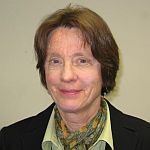 (HOST) Commentator Cyndy Bittinger notes the recent passing of a major figure from the German resistance during World War Two – and she has this remembrance.
(HOST) Commentator Cyndy Bittinger notes the recent passing of a major figure from the German resistance during World War Two – and she has this remembrance.
(BITTINGER) When Freya Von Moltke died in Norwich, on New Year’s Day, our regional newspaper headlined her obituary with "Nazi Resister."
I immediately turned to the archives of Dorothy Thompson, the famous radio journalist, part time Vermont resident, and refugee expert, to read her correspondence with Freya. I also found a newspaper article describing Freya’s role in the German Resistance. She carried out subversive assignments, transported dangerous documents, and acted as an assistant to her husband, Helmuth von Moltke, who was executed as a traitor for his opposition to Hitler and the Nazi regime in January of 1945.
Helmuth von Moltke and Dorothy Thompson had been friends for years and at the end of the war, Freya wrote to Thompson about her husband’s last days. "Helmuth was quite ready to die against national socialism..he was unbroken, unshaken and quite unchanged, calm and sometimes happy.he never lost but rather found his freedom."
Thompson considered Helmuth’s case "the most celebrated of the German Resistence."
Helmuth’s last letter to a friend before his execution included his concern for Freya, and his hope that he had left her " well prepared."
It was true that she was to live a long and productive life. After the war, she focused on her sons in that she was not willing to stay in Silesia and "see Helmuth’s two sons starve." Even in 1946, she wrote that the partition of Germany was already creating friction. She documented the status of children with ‘thousands having tuberculosis" and "73% undernourished." She feared that as many as five million Germans could be deported as the Poles moved in. She was forced to "flee from western Silesia before the Russians and the communist Poles came, who took no account of Nazis or anti-Nazis." With her family, she joined relatives of her late husband in South Africa.
In 1949, Dorothy urged Freya to give a series of talks in America about the German resistance and current conditions. Thompson described her as a speaker who was "quick-witted, deeply sincere.sunny natured, despite her terrible trials, and invariably popular."
Moving to Norwich in 1960, Freya continued to document the work of the German resistance. She also created a foundation to fund the Kreisau International Youth Center for European integration on the family’s former estate in Poland.
And she was active here as well. My husband, Bill, met Freya when she served on the board of the Twin Pines Housing Trust of Norwich. He was struck by "her presence and all that she represented, her calm demeanor and clear judgment.." She also provided leadership for the Hanover Co-op for more than twenty years.
Yet Freya von Moltke’s legacy will always be entwined with that of her husband. Their philosophy was, (quote), "To object and then to stand for what you believe in is one of the most important human activities to this day."